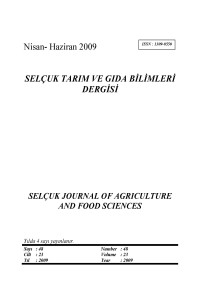Abstract
In this study conducted in Polatlı farm, four different applications in chick pea production were used. These are conventional application, reduced tillage, direct seeding with herbicides application and direct seeding without herbicides application. In grow chick pea, it was found that the highest energy usage proportion in total input energy is fertilizer energy, followed by seed, fuel-oil and machine energies, respectively. To take account of energy output/input rate the highest rate obtained from direct seeding with herbicides application, followed by direct seeding (1.369), conventional application (1.192) and reduced tillage (1.141), respectively. Consequently; it was understood that direct seeding application can be applied in chick pea production as well.
Keywords
Abstract
Polatlı tarım işletmesinde yürütülen bu çalışmada, nohut üretiminde 4 farklı uygulama kullanılmıştır. Bunlar, geleneksel, azaltılmış toprak işleme ve ekim öncesi yabancı ot kontrollü ve kontrolsüz doğrudan ekim uygulamasıdır. Nohut üretiminde, toplam girdi enerjileri içerisinde kullanım oranı en yüksek olanın gübre enerjisi olduğu bulunmuştur. Bunu sırasıyla tohum, yakıt-yağ ve makine enerjileri izlemiştir. Enerji çıktı / girdi oranı göz önüne alındığında en büyük oran 1.604 ile doğrudan ekim + herbisit uygulamasında elde edilirken, bunu sırasıyla 1.369 ile doğrudan ekimde, 1.192 ile geleneksel uygulamada ve 1.141 ile azaltılmış toprak işleme uygulaması izlemiştir. Sonuç olarak; doğrudan ekim uygulamasının nohut üretiminde de kullanılabileceği ortaya konulmuştur.
Keywords
Details
| Primary Language | English |
|---|---|
| Subjects | Agricultural Engineering |
| Journal Section | Research Article |
| Authors | |
| Publication Date | June 25, 2009 |
| Submission Date | January 1, 2009 |
| Published in Issue | Year 2009 Volume: 23 Issue: 48 |
Selcuk Agricultural and Food Sciences is licensed under a Creative Commons Attribution-NonCommercial 4.0 International License (CC BY NC).


